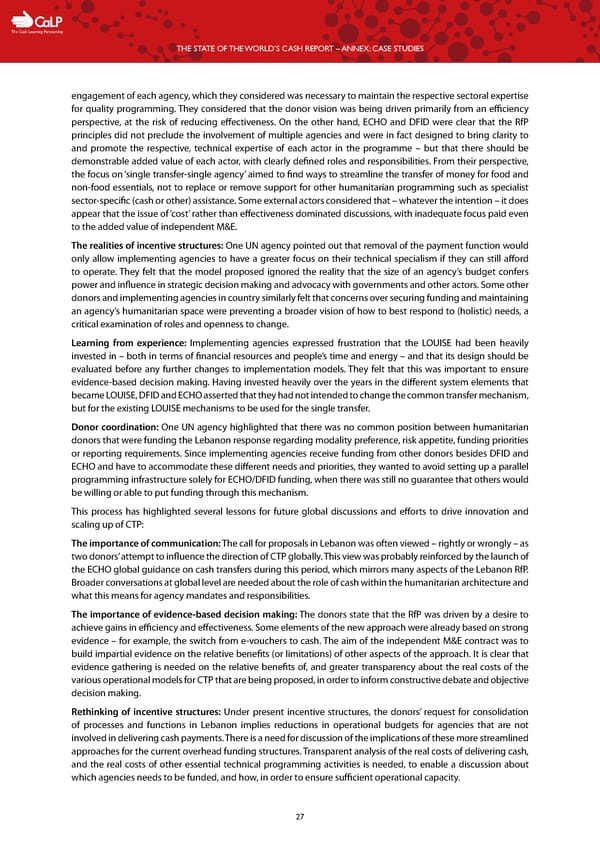C The Cash Learning Partnership THE STATE OF THE WORLD’S CASH REPORT – ANNEX: CASE STUDIES engagement of each agency, which they considered was necessary to maintain the respective sectoral expertise for quality programming. They considered that the donor vision was being driven primarily from an efficiency perspective, at the risk of reducing effectiveness. On the other hand, ECHO and DFID were clear that the RfP principles did not preclude the involvement of multiple agencies and were in fact designed to bring clarity to and promote the respective, technical expertise of each actor in the programme – but that there should be demonstrable added value of each actor, with clearly defined roles and responsibilities. From their perspective, the focus on ‘single transfer-single agency’ aimed to find ways to streamline the transfer of money for food and non-food essentials, not to replace or remove support for other humanitarian programming such as specialist sector-specific (cash or other) assistance. Some external actors considered that – whatever the intention – it does appear that the issue of ‘cost’ rather than effectiveness dominated discussions, with inadequate focus paid even to the added value of independent M&E. The realities of incentive structures: One UN agency pointed out that removal of the payment function would only allow implementing agencies to have a greater focus on their technical specialism if they can still afford to operate. They felt that the model proposed ignored the reality that the size of an agency’s budget confers power and influence in strategic decision making and advocacy with governments and other actors. Some other donors and implementing agencies in country similarly felt that concerns over securing funding and maintaining an agency’s humanitarian space were preventing a broader vision of how to best respond to (holistic) needs, a critical examination of roles and openness to change. Learning from experience: Implementing agencies expressed frustration that the LOUISE had been heavily invested in – both in terms of financial resources and people’s time and energy – and that its design should be evaluated before any further changes to implementation models. They felt that this was important to ensure evidence-based decision making. Having invested heavily over the years in the different system elements that became LOUISE, DFID and ECHO asserted that they had not intended to change the common transfer mechanism, but for the existing LOUISE mechanisms to be used for the single transfer. Donor coordination: One UN agency highlighted that there was no common position between humanitarian donors that were funding the Lebanon response regarding modality preference, risk appetite, funding priorities or reporting requirements. Since implementing agencies receive funding from other donors besides DFID and ECHO and have to accommodate these different needs and priorities, they wanted to avoid setting up a parallel programming infrastructure solely for ECHO/DFID funding, when there was still no guarantee that others would be willing or able to put funding through this mechanism. This process has highlighted several lessons for future global discussions and efforts to drive innovation and scaling up of CTP: The importance of communication: The call for proposals in Lebanon was often viewed – rightly or wrongly – as two donors’ attempt to influence the direction of CTP globally. This view was probably reinforced by the launch of the ECHO global guidance on cash transfers during this period, which mirrors many aspects of the Lebanon RfP. Broader conversations at global level are needed about the role of cash within the humanitarian architecture and what this means for agency mandates and responsibilities. The importance of evidence-based decision making: The donors state that the RfP was driven by a desire to achieve gains in efficiency and effectiveness. Some elements of the new approach were already based on strong evidence – for example, the switch from e-vouchers to cash. The aim of the independent M&E contract was to build impartial evidence on the relative benefits (or limitations) of other aspects of the approach. It is clear that evidence gathering is needed on the relative benefits of, and greater transparency about the real costs of the various operational models for CTP that are being proposed, in order to inform constructive debate and objective decision making. Rethinking of incentive structures: Under present incentive structures, the donors’ request for consolidation of processes and functions in Lebanon implies reductions in operational budgets for agencies that are not involved in delivering cash payments. There is a need for discussion of the implications of these more streamlined approaches for the current overhead funding structures. Transparent analysis of the real costs of delivering cash, and the real costs of other essential technical programming activities is needed, to enable a discussion about which agencies needs to be funded, and how, in order to ensure sufficient operational capacity. 27
 The State of the World's Cash | Case Studies Page 28 Page 30
The State of the World's Cash | Case Studies Page 28 Page 30